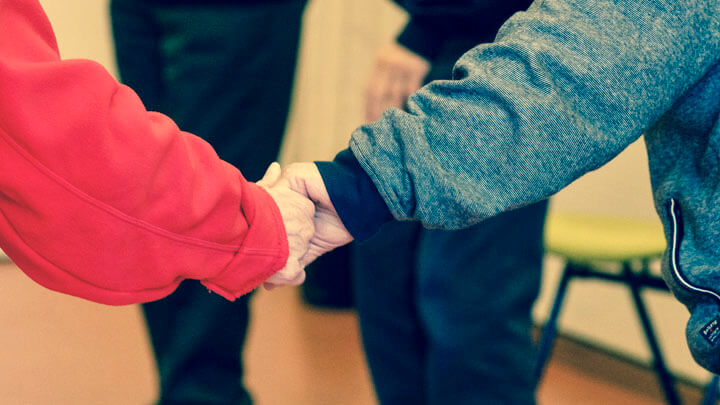Subscribe: Apple Podcasts | Google Podcasts | Email | RSS

It’s a question I hear whenever I tell someone I’m a personal historian. “What is personal history?” they ask.
Picture this:
It’s the end of the day. The dishes are done, the dog fed and walked, the house quiet. You settle into a favorite chair with a new book and soon you’re lost in the narrative, a story now funny, now sad, characters big and small. Just like in real life. And somehow all of it—the events, the people, the places—seem familiar.
Because this is your mom’s story. Or your granddad’s. Or Great-Uncle Roger’s.
This, dear reader, is personal history. Sitting down to read a book about someone you love, written by a professional, told in your beloved relative’s voice.
What if you’re the storyteller? What is personal history for you?
How about for you, the storyteller, the family member giving the gift of your life’s stories?
Surprisingly, the focus probably won’t rest so squarely on the final book. Yes, you’ll happily anticipate the day you’ll hold the book in hand. There may be tears, there will definitely by smiles. But the really profound experience for you, the storyteller, the thing that will engage your heart and mind, is the act of telling your stories during our interviews.
We’re all storytellers at heart; it’s a condition of being human. It’s how we pass down our understanding of the world, how we connect with each other, how we make meaning out of the chaos of everyday living. Not to mention, it’s fun. But the fires we used to sit around to tell our stories have died out and the family meals happen less and less. We don’t share the family stories as much as we used to because we don’t spend as much time together, and when we do, a million things pop up to distract us.
When you hire a personal historian, you’re engaging the services of someone who wants to hear your stories—the stories your family knows by heart and the ones you’ve forgotten but will re-discover during our journey together. You’ll experience the profound pleasure of revisiting in your memory the people, places, and events that shaped your life and made you who you are today. You’ll have the chance, so seldom encountered in today’s busy, disconnected world, to reflect back on the welter of experiences that make up a lifetime, to draw meaning and sense from them, to see long-ago events and how they led you to where you are now. And, you’ll do it all in the companionship of a caring listener.
What does a personal history book mean for future generations?
Honestly, we can’t know. But here’s a question you might consider: If you had the opportunity to read an account of your relative’s life—a favorite grandparent, a great-grandparent you’ve only heard about but never knew—how would you feel? Most likely, you’d be eager to find that favorite chair and curl up with your ancestor’s book, right? To learn about what their life was like seventy-five or a hundred or a hundred and fifty years ago. What was life like in America during World War I? Russia before the Revolution? Life on a farm, on a reservation, in a far-flung village? How did your ancestors cook their meals? Travel? Celebrate holidays? What was it like attending a one-room schoolhouse? Or working in a coal mine? A factory? Who was their first kiss? How did they choose whom to marry, and how did they raise their kids? How did they build the family business? How did they know what they needed to know to live?
And if they didn’t, how did they learn?
We’re closer to our ancestors than we realize. But if their stories aren’t preserved, both the stories and the people remain a mystery to us.
What is personal history to me, a personal historian?
I still recall the first time I heard about the growing field of personal history. I was talking to my friend, Betty, a historian. Betty knew I loved to write, and that I was looking for something meatier than the assignments I’d been doing for the St. Louis Post-Dispatch and other newspapers. She told me of a friend who worked as a personal historian, writing life stories.
Biographies?
Umm, no. These were written in the first person—the storyteller’s voice.
Memoirs?
Not really. The scope of the story wasn’t as narrow as what you find in a memoir. Plus, you know, they’re written in the storyteller’s voice but, well, not by the storyteller.
Huh?
I didn’t understand. And then I met the wonderful Kathy Evans, a personal historian in St. Louis, one of the best working in the field then and today. Kathy showed me samples of books she’d written for her many, many clients. Beautifully written, wonderfully illustrated with family photos and memorabilia.
When I leafed through these books, I knew the power they had. The power for the storyteller telling their story. The power for the family, who could read all about their loved one’s life.
As I held one of these extraordinary books in my hand, I knew I wanted in.
That meeting took place in 2010. A few months later, I founded The Story Scribe.
So what is personal history to me? It’s a passion, a livelihood, a calling. A way to share my talents as a listener, a writer, and a book producer. A way to help families overcome the constraints of time and attention that have made knowing each other so hard. A way to bring families closer together. A way to remind us that we will all someday die, but our stories don’t have to.